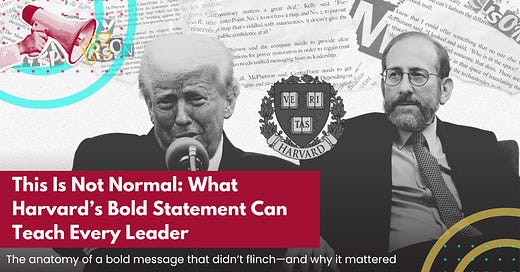This Is Not Normal: What Harvard’s Bold Statements Can Teach Every Leader
Now joined by hundreds of institutions, Harvard’s stand reveals what indestructible leadership really looks like.
Harvard University said no.
Then Harvard sued.
Now, hundreds of other university presidents have stepped forward to say: this is not normal.
In a rare joint statement, leaders from more than 200 colleges, universities, and scholarly organizations have issued a unified message condemning what they describe as “unprecedented government overreach and political interference” in the American higher education system.
This isn’t just a reputational flashpoint. It’s a turning point—and a loud one.
Higher ed is moving into new territory, where silence doesn’t signal caution—it signals collapse.
In this moment, speaking up isn’t risky. It’s necessary.
And the institutions willing to stand together may be the only ones that will still stand strong when all this is over.
And it all started with Harvard’s letter.
Courageous Leadership Starts With a Line in the Sand
When leaders speak from values—rooted in their mission, aligned with their stakeholders—they don’t just “weather” backlash. They rise through it.
In the letter posted to the Harvard website on April 14 titled “The Promise of American Higher Education,” President Alan M. Garber said no to demands that undermined its governance, mission, and constitutional rights. And it did so with clarity, confidence, and care.
That kind of statement doesn’t only come from PR consultants or crisis playbooks. It comes from values. From knowing who you are and being willing to say it publicly—even if it costs you.
In this case, Harvard is risking billions in federal funding.
But if you know how reputation works, then you also know this: the institution that spoke up will likely gain more in credibility, community trust, and long-term value than those that stayed silent.
One week later, on April 21, Garber released a follow-up message reaffirming Harvard’s commitment to combating antisemitism, defending institutional autonomy, and outlining next steps, including the release of task force reports.
To the bold go the reputational spoils.
Here’s Why These Two Letters Stopped Me—a Crisis Manager—in My Tracks
They weren’t tweets. They weren’t awkward videos of a university president squirming through a scripted apology. (My money is on former Penn president Liz Magill still waking up wishing she never agreed to that chair, that camera, or that disaster.)
They were formal messages.
Addressed to the Harvard community—but meant for every stakeholder who needed to hear it.
And both started with the one thing most statements skip: the facts.
Harvard didn’t make noise. It made a move.
Ones that were structured. Intentional. And grounded in something bigger than self-preservation.
Want to Write a Statement Like Harvard University?
Here’s the framework:
Start with shared ground.
Describe the pressure.
Say what you will not do.
Explain why.
Acknowledge complexity without surrendering clarity.
End with ownership.
It’s not easy. But it works.
And I’ve created a guide to help you do it.
Members: Download the Guide
How to Write a Bold Statement When the Stakes Are High
You’ll get the step-by-step breakdown I use with my clients, including one this month who was preparing a statement under real pressure. It's direct, effective, and designed for use.
🗓 Upcoming Member Event:
Inside the Chaos: How I Start a Crisis Response When Everything Is On Fire
Tuesday, April 30, at 12:00 p.m. ET.
Let’s Chat
When your company, institution, or organization is under fire—do you speak up? Or do you wait it out and hope the moment passes?
What do you think is really happening inside universities across the country right now?
Is this a turning point—or just the beginning?





I loooooove how Harvard handled this!!!!! I've worked with clients who won't own their truth during their crisis for fear of losing money, not being liked, losing stakeholders, etc. But owning your truth, speaking up and saying it publicly—even if it costs you- is TRUE LEADERSHIP. And anyone that understands how reputation works, knows that these brands and leaders will likely gain more in credibility, community trust, and long-term value than those that stayed silent.